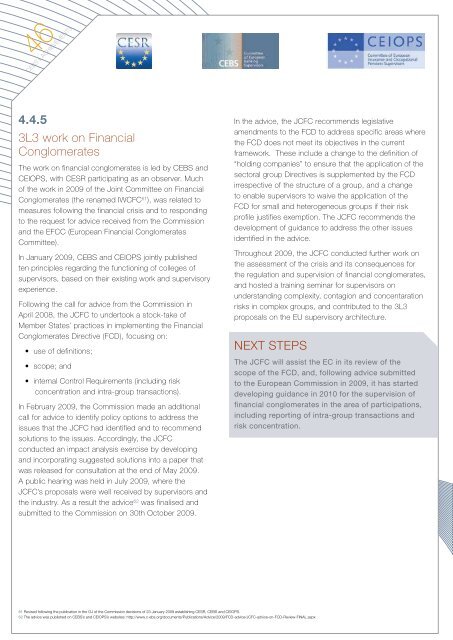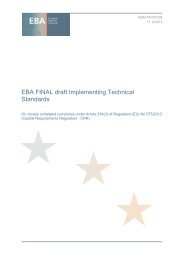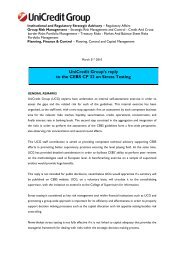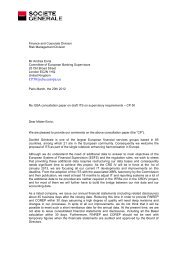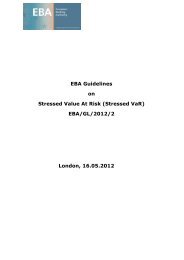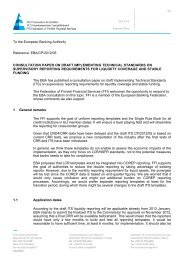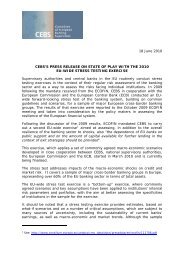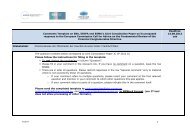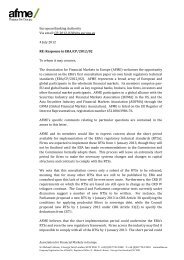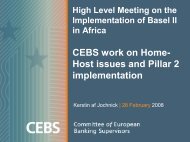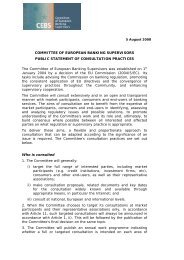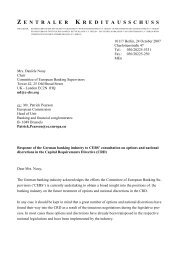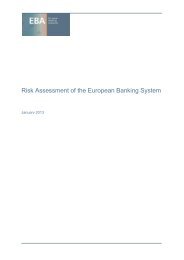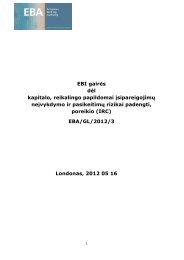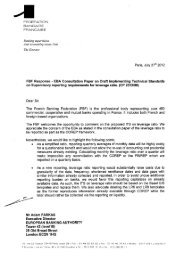Annual Report 2009 - European Banking Authority - Europa
Annual Report 2009 - European Banking Authority - Europa
Annual Report 2009 - European Banking Authority - Europa
You also want an ePaper? Increase the reach of your titles
YUMPU automatically turns print PDFs into web optimized ePapers that Google loves.
46<br />
CEBS’s ACHIEVEMENTS<br />
47<br />
CEBS’s ACHIEVEMENTS<br />
4.4.5<br />
3L3 work on Financial<br />
Conglomerates<br />
The work on financial conglomerates is led by CEBS and<br />
CEIOPS, with CESR participating as an observer. Much<br />
of the work in <strong>2009</strong> of the Joint Committee on Financial<br />
Conglomerates (the renamed IWCFC 61 ), was related to<br />
measures following the financial crisis and to responding<br />
to the request for advice received from the Commission<br />
and the EFCC (<strong>European</strong> Financial Conglomerates<br />
Committee).<br />
In January <strong>2009</strong>, CEBS and CEIOPS jointly published<br />
ten principles regarding the functioning of colleges of<br />
supervisors, based on their existing work and supervisory<br />
experience.<br />
Following the call for advice from the Commission in<br />
April 2008, the JCFC to undertook a stock-take of<br />
Member States’ practices in implementing the Financial<br />
Conglomerates Directive (FCD), focusing on:<br />
• use of definitions;<br />
• scope; and<br />
• internal Control Requirements (including risk<br />
concentration and intra-group transactions).<br />
In February <strong>2009</strong>, the Commission made an additional<br />
call for advice to identify policy options to address the<br />
issues that the JCFC had identified and to recommend<br />
solutions to the issues. Accordingly, the JCFC<br />
conducted an impact analysis exercise by developing<br />
and incorporating suggested solutions into a paper that<br />
was released for consultation at the end of May <strong>2009</strong>.<br />
A public hearing was held in July <strong>2009</strong>, where the<br />
JCFC’s proposals were well received by supervisors and<br />
the industry. As a result the advice 62 was finalised and<br />
submitted to the Commission on 30th October <strong>2009</strong>.<br />
In the advice, the JCFC recommends legislative<br />
amendments to the FCD to address specific areas where<br />
the FCD does not meet its objectives in the current<br />
framework. These include a change to the definition of<br />
“holding companies” to ensure that the application of the<br />
sectoral group Directives is supplemented by the FCD<br />
irrespective of the structure of a group, and a change<br />
to enable supervisors to waive the application of the<br />
FCD for small and heterogeneous groups if their risk<br />
profile justifies exemption. The JCFC recommends the<br />
development of guidance to address the other issues<br />
identified in the advice.<br />
Throughout <strong>2009</strong>, the JCFC conducted further work on<br />
the assessment of the crisis and its consequences for<br />
the regulation and supervision of financial conglomerates,<br />
and hosted a training seminar for supervisors on<br />
understanding complexity, contagion and concentaration<br />
risks in complex groups, and contributed to the 3L3<br />
proposals on the EU supervisory architecture.<br />
NEXT STEPS<br />
The JCFC will assist the EC in its review of the<br />
scope of the FCD, and, following advice submitted<br />
to the <strong>European</strong> Commission in <strong>2009</strong>, it has started<br />
developing guidance in 2010 for the supervision of<br />
financial conglomerates in the area of participations,<br />
including reporting of intra-group transactions and<br />
risk concentration.<br />
4.4.6<br />
3L3 Task Force on Internal<br />
Governance (TFIG)<br />
In July 2008, the 3L3 Committees set up a common Task<br />
Force on Internal Governance (TFIG) intended to address<br />
cross-sectoral issues related to internal governance. The<br />
purpose of the work was to develop, within the current<br />
legal framework, cross-sectoral guidance on internal<br />
governance for institutions and conglomerates operating<br />
in different financial sectors. To this end, the task force<br />
would identify the consequences of differences in Level<br />
1 and 2 measures regulating internal governance which<br />
might have a significant practical impact on institutions in<br />
terms of, for example, difficulties in application. The 3L3<br />
Task Force would also make recommendations, for Level<br />
3 measures, to enhance convergence in the EU. To this<br />
end the 3L3 Task force would be looking at Level 1 and 2<br />
measures on internal governance for the different financial<br />
sectors, namely MiFID, the CRD, Solvency II and the<br />
Financial Conglomerates Directive.<br />
In autumn <strong>2009</strong> the TFIG finalised its report on the main<br />
findings of the 3L3 internal governance issues following<br />
a cross-sectoral stock-take and analysis of internal<br />
governance requirements contained in MiFID, CRD and<br />
Solvency II. The report presents some preliminary findings<br />
on internal governance where the 3L3 could see merit<br />
in further work on convergence, such as conflicts of<br />
interest and outsourcing. Before undertaking further work,<br />
however, the 3L3 Committees sought the views of market<br />
participants and, on 18 December <strong>2009</strong>, launched a call<br />
for evidence (running until 9 April 2010) to get input from<br />
interested parties on whether cross-sectoral convergence<br />
is needed in the area of internal governance. The Task<br />
Force’s report was included as an Annex.<br />
The industry’s comments were sought on the findings<br />
of the Task Force’s stocktaking, and in particular on<br />
areas where conflicting rules for the different financial<br />
sectors might cause additional implementation burdens<br />
and where efforts of further harmonisation could be<br />
undertaken, specifically including:<br />
• how the risk management, compliance and internal<br />
audit functions might be “independent” in light of their<br />
different sectoral requirements; and<br />
• the supervisory review process.<br />
NEXT STEPS<br />
Taking into account the industry’s comments<br />
in response to their call for evidence, the 3L3<br />
Committees will decide on further steps and possible<br />
3L3 work with a view to further convergence.<br />
• management of conflicts of interest;<br />
• policies, processes and procedures related to the<br />
risks covered by the risk management systems;<br />
61 Revised following the publication in the OJ of the Commission decisions of 23 January <strong>2009</strong> establishing CESR, CEBS and CEIOPS.<br />
62 The advice was published on CEBS’s and CEIOPS’s websites: http://www.c-ebs.org/documents/Publications/Advice/<strong>2009</strong>/FCD-advice/JCFC-advice-on-FCD-Review-FINAL.aspx


